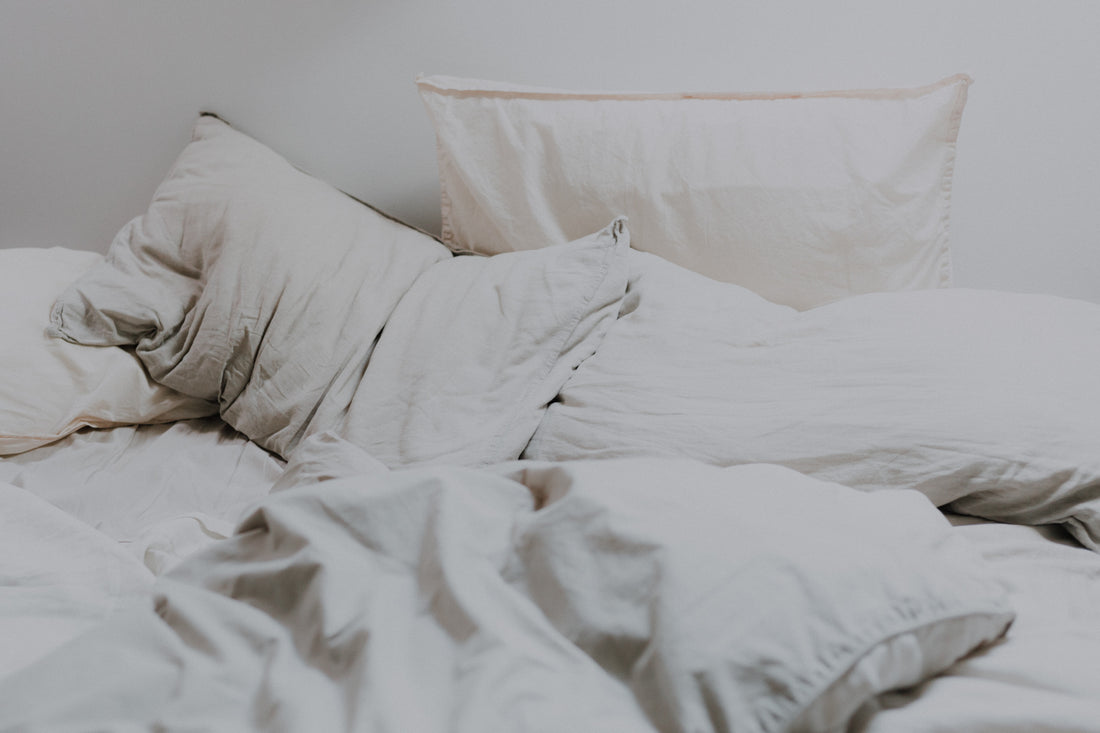
A Guide To A Good Night’s Sleep
Share
From the minute we are born, we are put into a regular sleep cycle that our body quickly adapts to ensure we are well-rested and can grow big and strong. Sleeping is the basis of any healthy lifestyle as it constitutes the first moments of when we’re preparing for the day, and at night reflects on how we have treated ourselves. Overall, sustaining a healthy sleeping pattern complemented by easily implementable habits before your head hits the pillow is a must – here are some incredibly helpful tricks to achieving that needed deep sleep!

For obvious reasons, meditation is one of the best daily rituals you should be engaging with. Not only for its several other health benefits such as an increased sense of self and anxiety reduction but also as it contributes to overall muscle and physiological relaxation. Prior to falling asleep at night, we recommend taking the time to sit or lie in a comfortable position, dim the lights and take in all of your senses. Deep and slow breaths from your belly to the chest will lower your heart rate, blood pressure and naturally ease your body into a wanted, and probably much needed, drift off to sleep.
Touching on sensory-based sleep induction, introducing pleasant aromas has been proven to naturally stimulate bodily relaxation. Through essential oils, flavoured dehumidifiers and sprays, inhaling light and soothing smells such as lavender is powerful in facilitating a natural de-stressing of the body.
We all know that what you put into your body affects almost every part of your health. In terms of optimal sleep, caffeine (coffee, tea, chocolate and sodas) should be avoided four to six hours before expected bedtime. These stimulant-based products will impede your bodies response to a natural slow down, therefore making it hard to fall asleep. Similarly, finishing your last meal several hours before bed is a must to allow for a natural digestion process and avoid any unwanted stomach aches when wanting to fall asleep. We know that late-night snacking is hard to avoid, so maybe opt for a non-caffeinated herbal tea that will support debloating and sugar-urges. Although alcohol does induce drowsiness, try to avoid that glass of wine as it negatively affects the brain waves and will cause a poor quality of sleep.
Naturally breaking that insomnia cycle is difficult, and sometimes we need a little help to get our sleep back on track. Magnesium, a natural mineral, helps the body fight inflammation and lowers blood pressure both of which will improve the ability to sleep. Taken in a supplement form, magnesium naturally relaxes and regulates the neurotransmitters within the body, which contains the hormone melatonin, therefore helping prepare the body and mind for sleep.
Take a relaxing, steamy, long shower or bath – it’s that simple. Studies have shown that taking a 90-minute hot bath or a lengthy shower will not only improve initial falling asleep but also the quality of rest throughout the night. We often neglect the thought of sleep quality as opposed to quantity, sometimes five hours of deep sleep is better than a full night of tossing and turning.
The bottom line is that sleep plays a key role in all aspects of health. Insufficient sleep is directly linked to other health issues such as obesity and anxiety. We at Ritology recommend achieving 7 – 8 hours of QUALITY sleep every night and sticking to the same timing, even on weekends. Trust us, and take on some of these easy and low cost tips today! Your future self will thank us, promise.
